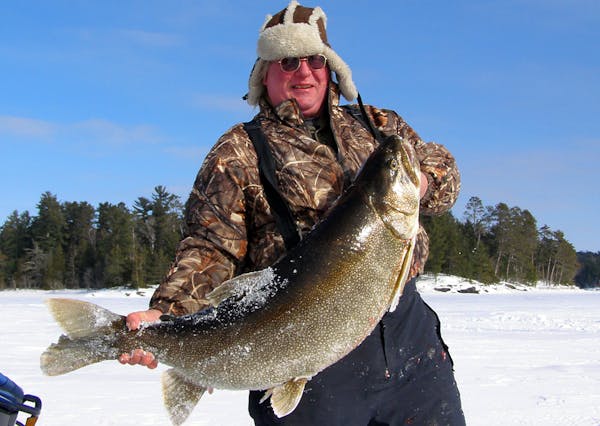When Rob Scott hand-lined a 4-pound lake trout through the ice on Lac la Croix the morning of Feb. 8, and kept the fish, he couldn't know his world was about to change.
Scott, 65, of Crane Lake, Minn., on the Ontario border, is a retired Navy captain and knowledgeable fisherman. Catching one trout was a fortunate thing, he knew, and he was happy enough. Still, he'd hang around a while, and bait another tip-up with a shiner. His nephew and another angler were due on the lake later in the day, and perhaps they'd fish together.
Besides, Scott figured, he might get lucky and catch another laker, which he could release, knowing the Ontario limit is one. Or, as likely where he was fishing, he might catch a whitefish or even a northern.
Settling in, he was enjoying the day when two snowmobiles appeared. These would be officers from the Ontario Ministry of Natural Resources, a common sight on the Canadian side of Lac la Croix.
The officers made small talk, checked his license and took note of his trout lying on the ice. That he was still fishing wasn't discussed, because the officers knew it to be legal, as Scott did. About 20 minutes later the men and their sleds disappeared down the lake, patrolling.
It wouldn't be until after the sun had passed its midpoint that Scott's tip-up flag would jerk upright again, and a struggle between him and a beast of gigantic proportions would ensue.
The fish Scott would fight for an hour before pulling it into the daylight would tip a handheld scale at 52 pounds, 3 ounces, easily besting the world record lake trout taken on a tip-up. That fish weighed 29 pounds, 6 ounces and was caught in Vermont in 1996.
Laying the big trout on the ice, Scott would recall later that his "adrenaline was pumping." Near death after having been excised from a depth of about 55 feet, the fish's decades-long life was over. Releasing it — even if Scott wanted to — wasn't an option. If the fish made it back through the lake's 3 feet of ice, it would succumb moments later.
Now Scott had two trout.
"My nephew was fishing not too far away," he would say, "and after I caught the big fish I gave the smaller trout to him."
Had Scott been fishing on the Minnesota side of Lac la Croix, 100 feet or so from where he caught the big trout, he could have kept both fish, because the Minnesota lake trout limit is two.
But the Ontario limit is one, and that province, unlike Minnesota, offers no allowance for "party fishing," meaning Scott couldn't legally give the fish away.
Additionally, Ontario prohibits releasing a fish that is dead or likely to die, assigning the offense of wanton waste to that practice.
In Minnesota, anglers are allowed considerably more leeway. In a single watercraft, limits can be shared, meaning if one angler has a hot hand and catches a limit, he can keep fishing to help fill his buddy's legal quota. The same is true for shore anglers, and even anglers in two boats, provided the "party" is within sight and can communicate by voice.
But Scott was in Ontario, and in his heart of hearts he figured little harm would be done by gifting the smaller trout to his nephew.
Scott contacted no media about his fish. Instead, one guy told another who told another who called me, and a couple of phone calls later I had Scott on the line, happily telling his fish tale — sans the part about the smaller trout — and sending a photo of his catch via the Internet.
Unfortunately for Scott, my column celebrating him and his fish was published Feb. 16, and among its readers were the Ontario Ministry of Natural Resources officers who checked him on the ice. They knew he had the smaller trout, and the bigger fish would have put him over his limit.
Which is why on Monday, a Minnesota Department of Natural Resources officer confiscated Scott's fish from a Duluth taxidermist, and why the trout will be turned over to Ontario officials soon. Also on Monday, Scott was interviewed at his home by two DNR officers, working in cooperation with their Ontario counterparts.
Uncertain what, if any, charges might be forthcoming, Scott seeks no shelter.
"Look, I talked to the Ontario officers Monday and told them what happened," he said. "It wasn't illegal for me to keep fishing after I caught the first trout. But when I caught the bigger fish, with the adrenaline and everything I had going, and the fact that it wasn't going to survive if I released it, I figured if I gave the smaller fish away, that would be OK."
Added Scott: "I have friends who are lawyers who say I shouldn't have said anything to the officers, and all that. That's not me. I told them the way it was."
Dennis Anderson • danderson@startribune.com

Anderson: Celebrate Earth Day by rekindling real connection to nature
Anderson: Anglers protesting tough new Mille Lacs rules are wrong

Anderson: Courts, not politicians, should rule on Red Lake, White Earth lands

Anderson: Multimillion windfall gets invasive carp deterrent moving
![A young whitetail deer searches for food as another blanket of snow coats the arrowhead. ] Minnesota -State of Wonders, Arrowhead in Winter BRIAN PETE](https://arc.stimg.co/startribunemedia/WK32UWWY6FKNWJUIYCJ6ZPT4AU.jpg?h=91&w=145&fit=crop&bg=999&crop=faces)

